Understanding Tourism: Development, Socio-cultural & Economic Impacts
VerifiedAdded on 2023/06/18
|7
|1968
|287
Report
AI Summary
This report provides a comprehensive overview of the tourism industry, focusing on the development of contemporary tourism and the significant factors influencing it. It examines the positive and negative economic impacts, such as job creation and increased GDP versus cultural changes and infrastructure costs. The report also identifies and discusses the positive and negative environmental impacts, including environmental protection efforts versus pollution and habitat loss. Furthermore, it analyzes the socio-cultural impacts of tourism, highlighting cross-cultural interaction and community empowerment alongside potential issues like overcrowding and cultural commodification. The report concludes by emphasizing the importance of sustainable practices and regulatory compliance to mitigate negative impacts and ensure the long-term viability of the tourism industry, recommending a focus on environmental safety to address concerns like carbon footprints. Desklib offers a wealth of similar solved assignments and study resources for students.
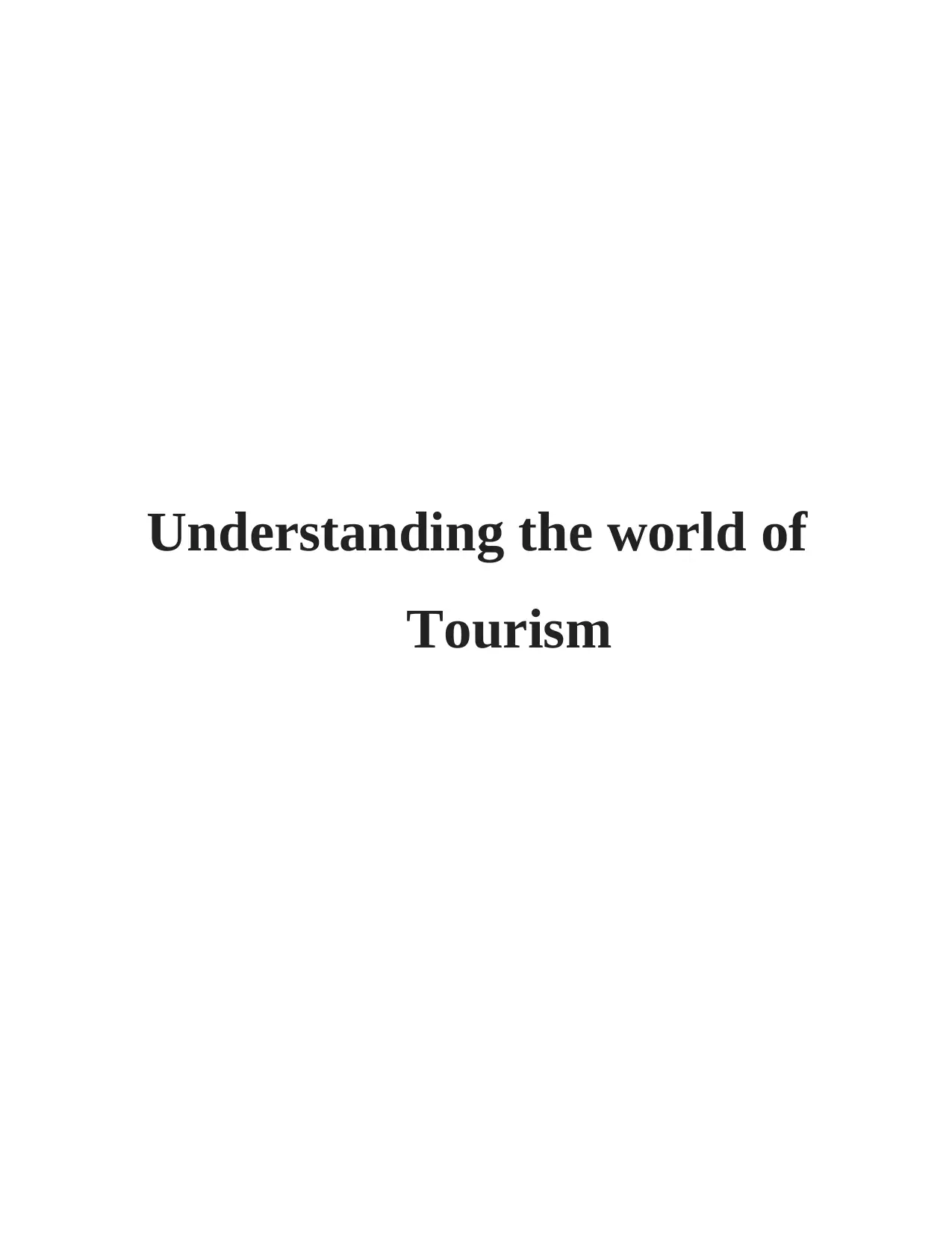
Understanding the world of
Tourism
Tourism
Paraphrase This Document
Need a fresh take? Get an instant paraphrase of this document with our AI Paraphraser
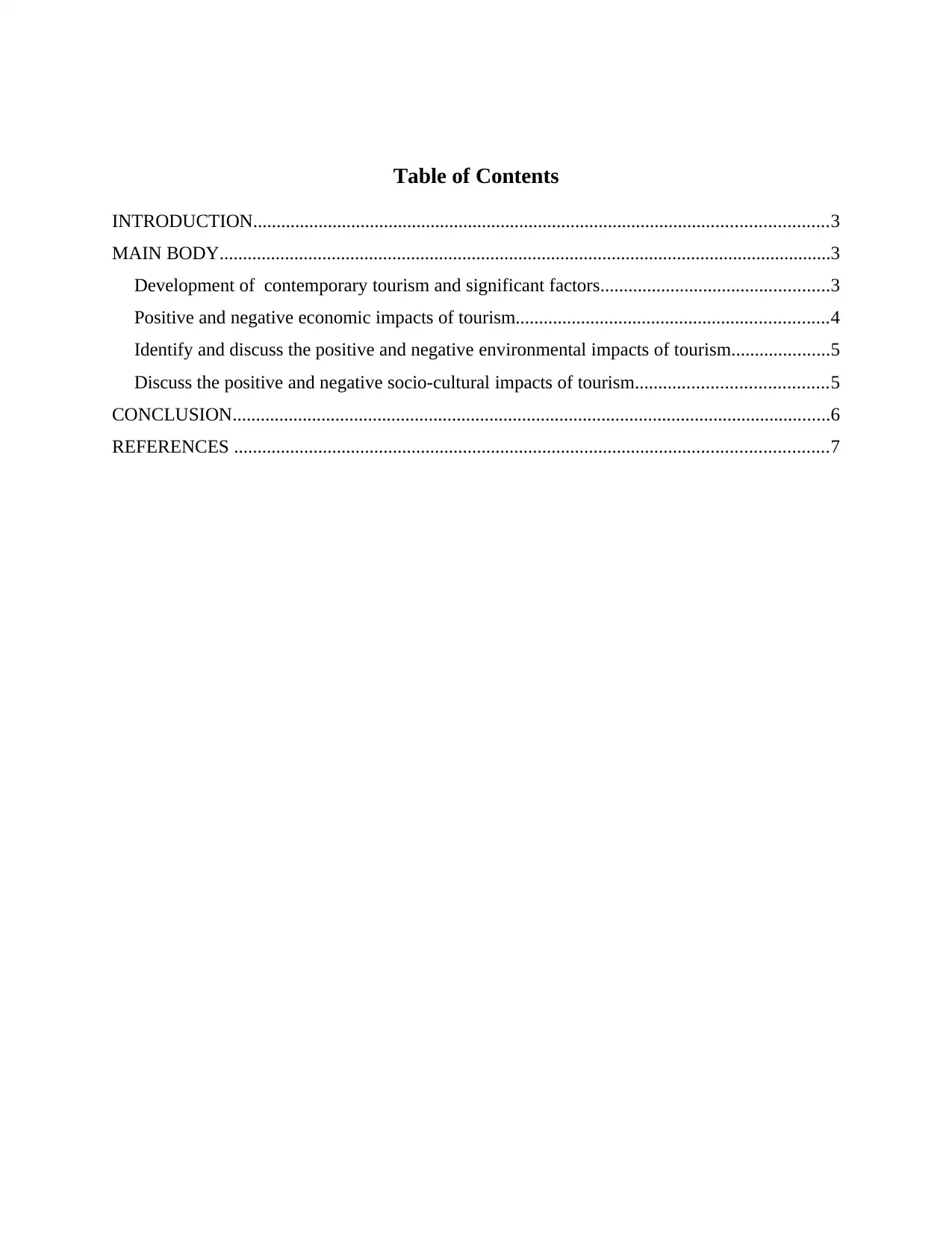
Table of Contents
INTRODUCTION...........................................................................................................................3
MAIN BODY...................................................................................................................................3
Development of contemporary tourism and significant factors.................................................3
Positive and negative economic impacts of tourism...................................................................4
Identify and discuss the positive and negative environmental impacts of tourism.....................5
Discuss the positive and negative socio-cultural impacts of tourism.........................................5
CONCLUSION................................................................................................................................6
REFERENCES ...............................................................................................................................7
INTRODUCTION...........................................................................................................................3
MAIN BODY...................................................................................................................................3
Development of contemporary tourism and significant factors.................................................3
Positive and negative economic impacts of tourism...................................................................4
Identify and discuss the positive and negative environmental impacts of tourism.....................5
Discuss the positive and negative socio-cultural impacts of tourism.........................................5
CONCLUSION................................................................................................................................6
REFERENCES ...............................................................................................................................7
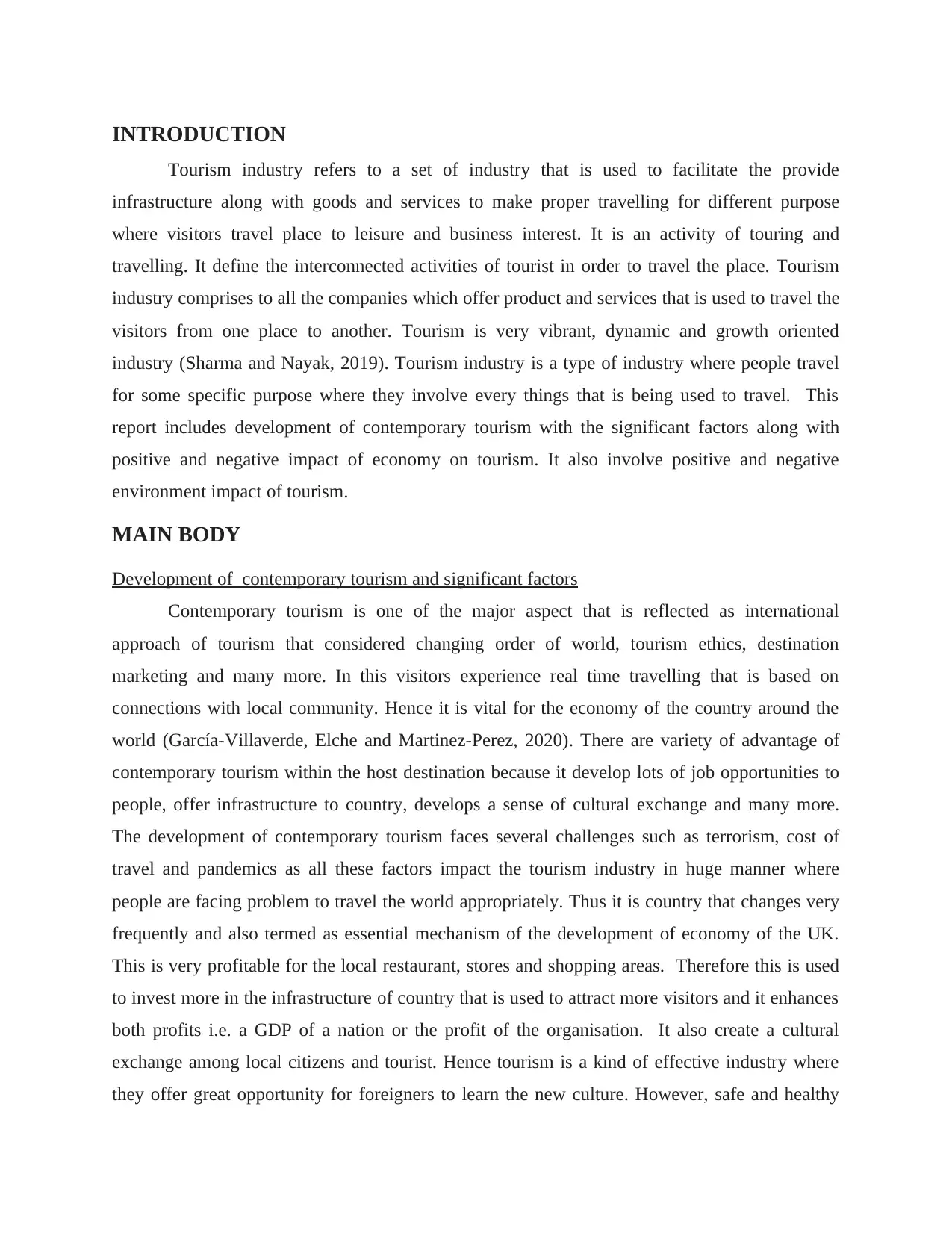
INTRODUCTION
Tourism industry refers to a set of industry that is used to facilitate the provide
infrastructure along with goods and services to make proper travelling for different purpose
where visitors travel place to leisure and business interest. It is an activity of touring and
travelling. It define the interconnected activities of tourist in order to travel the place. Tourism
industry comprises to all the companies which offer product and services that is used to travel the
visitors from one place to another. Tourism is very vibrant, dynamic and growth oriented
industry (Sharma and Nayak, 2019). Tourism industry is a type of industry where people travel
for some specific purpose where they involve every things that is being used to travel. This
report includes development of contemporary tourism with the significant factors along with
positive and negative impact of economy on tourism. It also involve positive and negative
environment impact of tourism.
MAIN BODY
Development of contemporary tourism and significant factors
Contemporary tourism is one of the major aspect that is reflected as international
approach of tourism that considered changing order of world, tourism ethics, destination
marketing and many more. In this visitors experience real time travelling that is based on
connections with local community. Hence it is vital for the economy of the country around the
world (García-Villaverde, Elche and Martinez-Perez, 2020). There are variety of advantage of
contemporary tourism within the host destination because it develop lots of job opportunities to
people, offer infrastructure to country, develops a sense of cultural exchange and many more.
The development of contemporary tourism faces several challenges such as terrorism, cost of
travel and pandemics as all these factors impact the tourism industry in huge manner where
people are facing problem to travel the world appropriately. Thus it is country that changes very
frequently and also termed as essential mechanism of the development of economy of the UK.
This is very profitable for the local restaurant, stores and shopping areas. Therefore this is used
to invest more in the infrastructure of country that is used to attract more visitors and it enhances
both profits i.e. a GDP of a nation or the profit of the organisation. It also create a cultural
exchange among local citizens and tourist. Hence tourism is a kind of effective industry where
they offer great opportunity for foreigners to learn the new culture. However, safe and healthy
Tourism industry refers to a set of industry that is used to facilitate the provide
infrastructure along with goods and services to make proper travelling for different purpose
where visitors travel place to leisure and business interest. It is an activity of touring and
travelling. It define the interconnected activities of tourist in order to travel the place. Tourism
industry comprises to all the companies which offer product and services that is used to travel the
visitors from one place to another. Tourism is very vibrant, dynamic and growth oriented
industry (Sharma and Nayak, 2019). Tourism industry is a type of industry where people travel
for some specific purpose where they involve every things that is being used to travel. This
report includes development of contemporary tourism with the significant factors along with
positive and negative impact of economy on tourism. It also involve positive and negative
environment impact of tourism.
MAIN BODY
Development of contemporary tourism and significant factors
Contemporary tourism is one of the major aspect that is reflected as international
approach of tourism that considered changing order of world, tourism ethics, destination
marketing and many more. In this visitors experience real time travelling that is based on
connections with local community. Hence it is vital for the economy of the country around the
world (García-Villaverde, Elche and Martinez-Perez, 2020). There are variety of advantage of
contemporary tourism within the host destination because it develop lots of job opportunities to
people, offer infrastructure to country, develops a sense of cultural exchange and many more.
The development of contemporary tourism faces several challenges such as terrorism, cost of
travel and pandemics as all these factors impact the tourism industry in huge manner where
people are facing problem to travel the world appropriately. Thus it is country that changes very
frequently and also termed as essential mechanism of the development of economy of the UK.
This is very profitable for the local restaurant, stores and shopping areas. Therefore this is used
to invest more in the infrastructure of country that is used to attract more visitors and it enhances
both profits i.e. a GDP of a nation or the profit of the organisation. It also create a cultural
exchange among local citizens and tourist. Hence tourism is a kind of effective industry where
they offer great opportunity for foreigners to learn the new culture. However, safe and healthy
⊘ This is a preview!⊘
Do you want full access?
Subscribe today to unlock all pages.

Trusted by 1+ million students worldwide
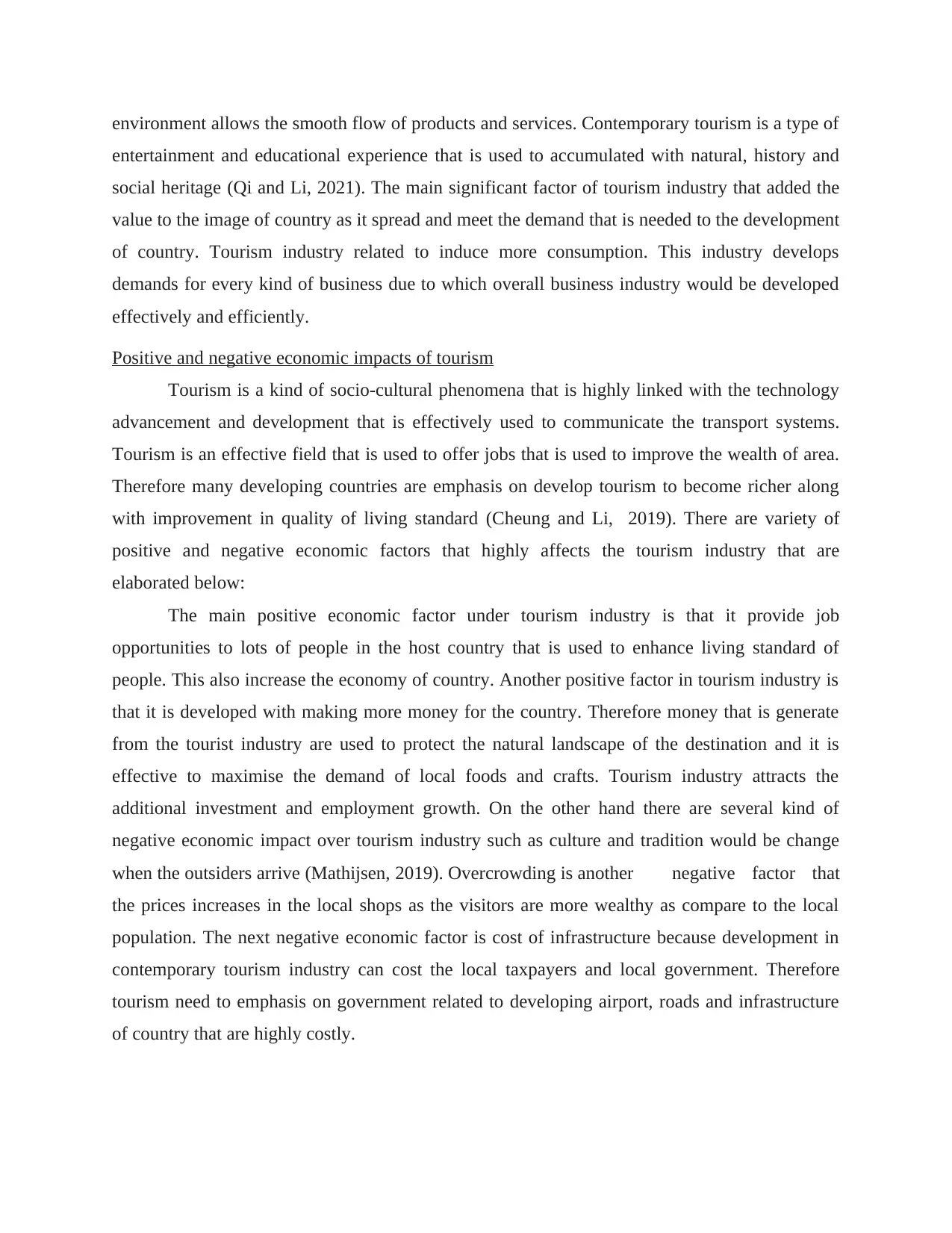
environment allows the smooth flow of products and services. Contemporary tourism is a type of
entertainment and educational experience that is used to accumulated with natural, history and
social heritage (Qi and Li, 2021). The main significant factor of tourism industry that added the
value to the image of country as it spread and meet the demand that is needed to the development
of country. Tourism industry related to induce more consumption. This industry develops
demands for every kind of business due to which overall business industry would be developed
effectively and efficiently.
Positive and negative economic impacts of tourism
Tourism is a kind of socio-cultural phenomena that is highly linked with the technology
advancement and development that is effectively used to communicate the transport systems.
Tourism is an effective field that is used to offer jobs that is used to improve the wealth of area.
Therefore many developing countries are emphasis on develop tourism to become richer along
with improvement in quality of living standard (Cheung and Li, 2019). There are variety of
positive and negative economic factors that highly affects the tourism industry that are
elaborated below:
The main positive economic factor under tourism industry is that it provide job
opportunities to lots of people in the host country that is used to enhance living standard of
people. This also increase the economy of country. Another positive factor in tourism industry is
that it is developed with making more money for the country. Therefore money that is generate
from the tourist industry are used to protect the natural landscape of the destination and it is
effective to maximise the demand of local foods and crafts. Tourism industry attracts the
additional investment and employment growth. On the other hand there are several kind of
negative economic impact over tourism industry such as culture and tradition would be change
when the outsiders arrive (Mathijsen, 2019). Overcrowding is another negative factor that
the prices increases in the local shops as the visitors are more wealthy as compare to the local
population. The next negative economic factor is cost of infrastructure because development in
contemporary tourism industry can cost the local taxpayers and local government. Therefore
tourism need to emphasis on government related to developing airport, roads and infrastructure
of country that are highly costly.
entertainment and educational experience that is used to accumulated with natural, history and
social heritage (Qi and Li, 2021). The main significant factor of tourism industry that added the
value to the image of country as it spread and meet the demand that is needed to the development
of country. Tourism industry related to induce more consumption. This industry develops
demands for every kind of business due to which overall business industry would be developed
effectively and efficiently.
Positive and negative economic impacts of tourism
Tourism is a kind of socio-cultural phenomena that is highly linked with the technology
advancement and development that is effectively used to communicate the transport systems.
Tourism is an effective field that is used to offer jobs that is used to improve the wealth of area.
Therefore many developing countries are emphasis on develop tourism to become richer along
with improvement in quality of living standard (Cheung and Li, 2019). There are variety of
positive and negative economic factors that highly affects the tourism industry that are
elaborated below:
The main positive economic factor under tourism industry is that it provide job
opportunities to lots of people in the host country that is used to enhance living standard of
people. This also increase the economy of country. Another positive factor in tourism industry is
that it is developed with making more money for the country. Therefore money that is generate
from the tourist industry are used to protect the natural landscape of the destination and it is
effective to maximise the demand of local foods and crafts. Tourism industry attracts the
additional investment and employment growth. On the other hand there are several kind of
negative economic impact over tourism industry such as culture and tradition would be change
when the outsiders arrive (Mathijsen, 2019). Overcrowding is another negative factor that
the prices increases in the local shops as the visitors are more wealthy as compare to the local
population. The next negative economic factor is cost of infrastructure because development in
contemporary tourism industry can cost the local taxpayers and local government. Therefore
tourism need to emphasis on government related to developing airport, roads and infrastructure
of country that are highly costly.
Paraphrase This Document
Need a fresh take? Get an instant paraphrase of this document with our AI Paraphraser
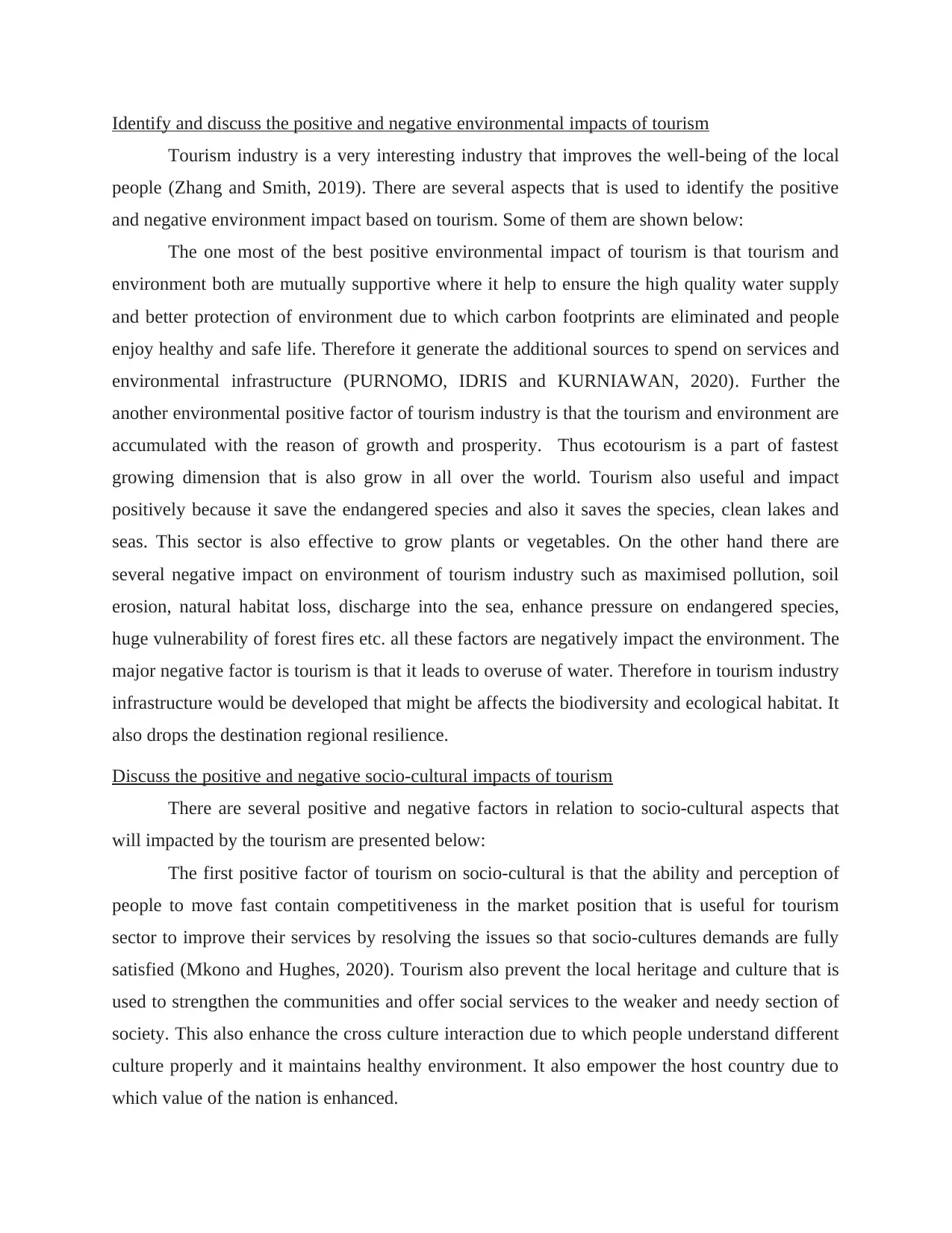
Identify and discuss the positive and negative environmental impacts of tourism
Tourism industry is a very interesting industry that improves the well-being of the local
people (Zhang and Smith, 2019). There are several aspects that is used to identify the positive
and negative environment impact based on tourism. Some of them are shown below:
The one most of the best positive environmental impact of tourism is that tourism and
environment both are mutually supportive where it help to ensure the high quality water supply
and better protection of environment due to which carbon footprints are eliminated and people
enjoy healthy and safe life. Therefore it generate the additional sources to spend on services and
environmental infrastructure (PURNOMO, IDRIS and KURNIAWAN, 2020). Further the
another environmental positive factor of tourism industry is that the tourism and environment are
accumulated with the reason of growth and prosperity. Thus ecotourism is a part of fastest
growing dimension that is also grow in all over the world. Tourism also useful and impact
positively because it save the endangered species and also it saves the species, clean lakes and
seas. This sector is also effective to grow plants or vegetables. On the other hand there are
several negative impact on environment of tourism industry such as maximised pollution, soil
erosion, natural habitat loss, discharge into the sea, enhance pressure on endangered species,
huge vulnerability of forest fires etc. all these factors are negatively impact the environment. The
major negative factor is tourism is that it leads to overuse of water. Therefore in tourism industry
infrastructure would be developed that might be affects the biodiversity and ecological habitat. It
also drops the destination regional resilience.
Discuss the positive and negative socio-cultural impacts of tourism
There are several positive and negative factors in relation to socio-cultural aspects that
will impacted by the tourism are presented below:
The first positive factor of tourism on socio-cultural is that the ability and perception of
people to move fast contain competitiveness in the market position that is useful for tourism
sector to improve their services by resolving the issues so that socio-cultures demands are fully
satisfied (Mkono and Hughes, 2020). Tourism also prevent the local heritage and culture that is
used to strengthen the communities and offer social services to the weaker and needy section of
society. This also enhance the cross culture interaction due to which people understand different
culture properly and it maintains healthy environment. It also empower the host country due to
which value of the nation is enhanced.
Tourism industry is a very interesting industry that improves the well-being of the local
people (Zhang and Smith, 2019). There are several aspects that is used to identify the positive
and negative environment impact based on tourism. Some of them are shown below:
The one most of the best positive environmental impact of tourism is that tourism and
environment both are mutually supportive where it help to ensure the high quality water supply
and better protection of environment due to which carbon footprints are eliminated and people
enjoy healthy and safe life. Therefore it generate the additional sources to spend on services and
environmental infrastructure (PURNOMO, IDRIS and KURNIAWAN, 2020). Further the
another environmental positive factor of tourism industry is that the tourism and environment are
accumulated with the reason of growth and prosperity. Thus ecotourism is a part of fastest
growing dimension that is also grow in all over the world. Tourism also useful and impact
positively because it save the endangered species and also it saves the species, clean lakes and
seas. This sector is also effective to grow plants or vegetables. On the other hand there are
several negative impact on environment of tourism industry such as maximised pollution, soil
erosion, natural habitat loss, discharge into the sea, enhance pressure on endangered species,
huge vulnerability of forest fires etc. all these factors are negatively impact the environment. The
major negative factor is tourism is that it leads to overuse of water. Therefore in tourism industry
infrastructure would be developed that might be affects the biodiversity and ecological habitat. It
also drops the destination regional resilience.
Discuss the positive and negative socio-cultural impacts of tourism
There are several positive and negative factors in relation to socio-cultural aspects that
will impacted by the tourism are presented below:
The first positive factor of tourism on socio-cultural is that the ability and perception of
people to move fast contain competitiveness in the market position that is useful for tourism
sector to improve their services by resolving the issues so that socio-cultures demands are fully
satisfied (Mkono and Hughes, 2020). Tourism also prevent the local heritage and culture that is
used to strengthen the communities and offer social services to the weaker and needy section of
society. This also enhance the cross culture interaction due to which people understand different
culture properly and it maintains healthy environment. It also empower the host country due to
which value of the nation is enhanced.
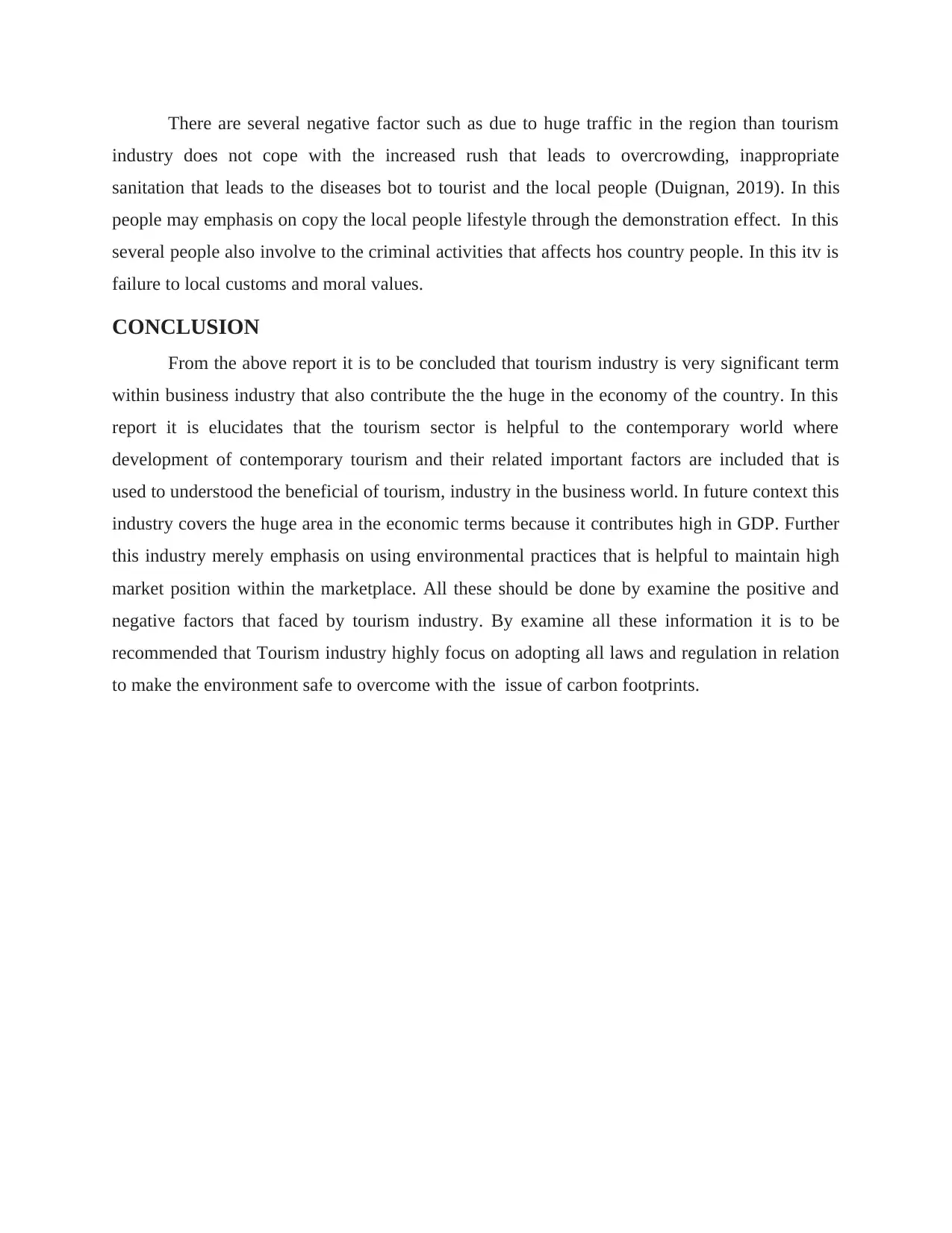
There are several negative factor such as due to huge traffic in the region than tourism
industry does not cope with the increased rush that leads to overcrowding, inappropriate
sanitation that leads to the diseases bot to tourist and the local people (Duignan, 2019). In this
people may emphasis on copy the local people lifestyle through the demonstration effect. In this
several people also involve to the criminal activities that affects hos country people. In this itv is
failure to local customs and moral values.
CONCLUSION
From the above report it is to be concluded that tourism industry is very significant term
within business industry that also contribute the the huge in the economy of the country. In this
report it is elucidates that the tourism sector is helpful to the contemporary world where
development of contemporary tourism and their related important factors are included that is
used to understood the beneficial of tourism, industry in the business world. In future context this
industry covers the huge area in the economic terms because it contributes high in GDP. Further
this industry merely emphasis on using environmental practices that is helpful to maintain high
market position within the marketplace. All these should be done by examine the positive and
negative factors that faced by tourism industry. By examine all these information it is to be
recommended that Tourism industry highly focus on adopting all laws and regulation in relation
to make the environment safe to overcome with the issue of carbon footprints.
industry does not cope with the increased rush that leads to overcrowding, inappropriate
sanitation that leads to the diseases bot to tourist and the local people (Duignan, 2019). In this
people may emphasis on copy the local people lifestyle through the demonstration effect. In this
several people also involve to the criminal activities that affects hos country people. In this itv is
failure to local customs and moral values.
CONCLUSION
From the above report it is to be concluded that tourism industry is very significant term
within business industry that also contribute the the huge in the economy of the country. In this
report it is elucidates that the tourism sector is helpful to the contemporary world where
development of contemporary tourism and their related important factors are included that is
used to understood the beneficial of tourism, industry in the business world. In future context this
industry covers the huge area in the economic terms because it contributes high in GDP. Further
this industry merely emphasis on using environmental practices that is helpful to maintain high
market position within the marketplace. All these should be done by examine the positive and
negative factors that faced by tourism industry. By examine all these information it is to be
recommended that Tourism industry highly focus on adopting all laws and regulation in relation
to make the environment safe to overcome with the issue of carbon footprints.
⊘ This is a preview!⊘
Do you want full access?
Subscribe today to unlock all pages.

Trusted by 1+ million students worldwide
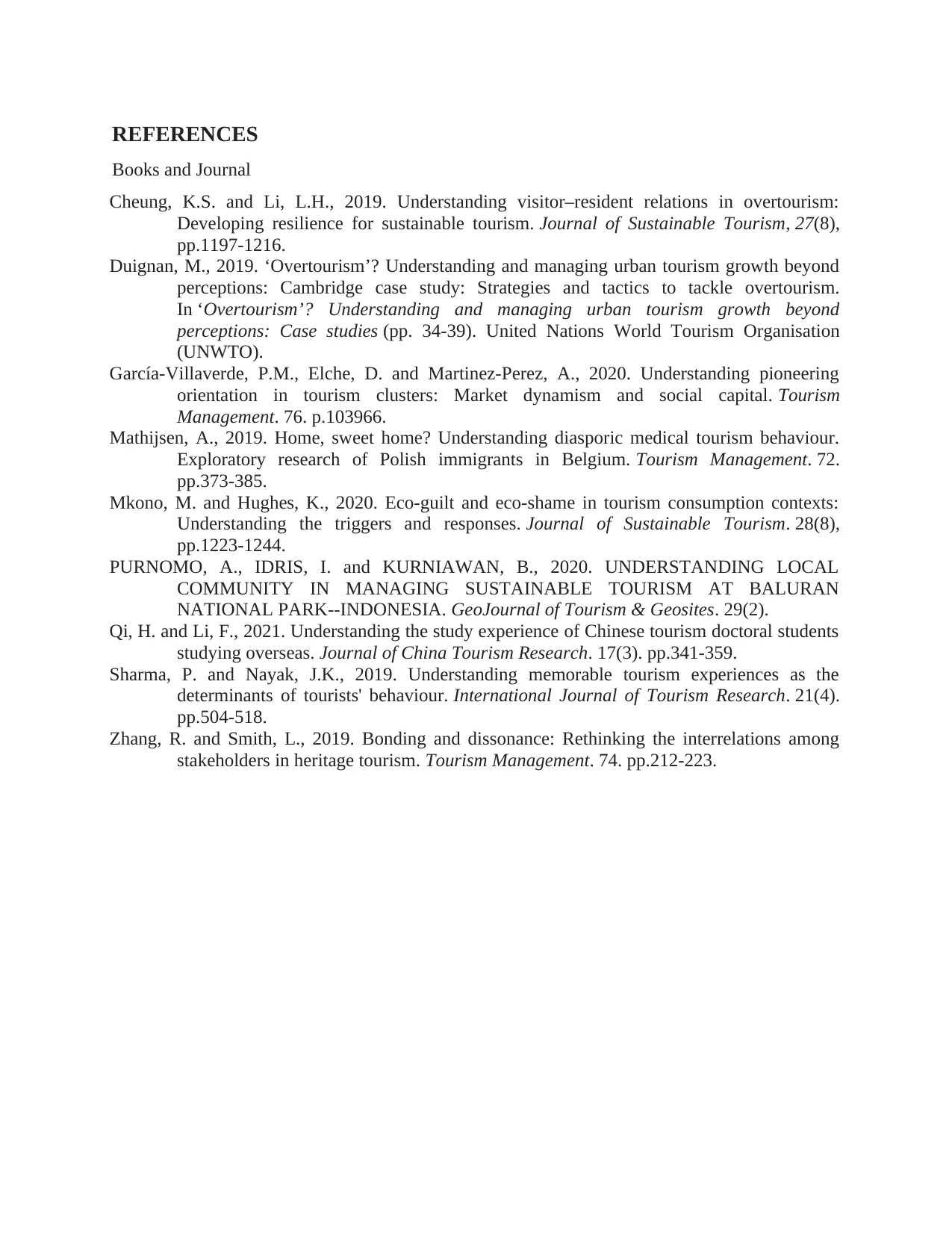
REFERENCES
Books and Journal
Cheung, K.S. and Li, L.H., 2019. Understanding visitor–resident relations in overtourism:
Developing resilience for sustainable tourism. Journal of Sustainable Tourism, 27(8),
pp.1197-1216.
Duignan, M., 2019. ‘Overtourism’? Understanding and managing urban tourism growth beyond
perceptions: Cambridge case study: Strategies and tactics to tackle overtourism.
In ‘Overtourism’? Understanding and managing urban tourism growth beyond
perceptions: Case studies (pp. 34-39). United Nations World Tourism Organisation
(UNWTO).
García-Villaverde, P.M., Elche, D. and Martinez-Perez, A., 2020. Understanding pioneering
orientation in tourism clusters: Market dynamism and social capital. Tourism
Management. 76. p.103966.
Mathijsen, A., 2019. Home, sweet home? Understanding diasporic medical tourism behaviour.
Exploratory research of Polish immigrants in Belgium. Tourism Management. 72.
pp.373-385.
Mkono, M. and Hughes, K., 2020. Eco-guilt and eco-shame in tourism consumption contexts:
Understanding the triggers and responses. Journal of Sustainable Tourism. 28(8),
pp.1223-1244.
PURNOMO, A., IDRIS, I. and KURNIAWAN, B., 2020. UNDERSTANDING LOCAL
COMMUNITY IN MANAGING SUSTAINABLE TOURISM AT BALURAN
NATIONAL PARK--INDONESIA. GeoJournal of Tourism & Geosites. 29(2).
Qi, H. and Li, F., 2021. Understanding the study experience of Chinese tourism doctoral students
studying overseas. Journal of China Tourism Research. 17(3). pp.341-359.
Sharma, P. and Nayak, J.K., 2019. Understanding memorable tourism experiences as the
determinants of tourists' behaviour. International Journal of Tourism Research. 21(4).
pp.504-518.
Zhang, R. and Smith, L., 2019. Bonding and dissonance: Rethinking the interrelations among
stakeholders in heritage tourism. Tourism Management. 74. pp.212-223.
Books and Journal
Cheung, K.S. and Li, L.H., 2019. Understanding visitor–resident relations in overtourism:
Developing resilience for sustainable tourism. Journal of Sustainable Tourism, 27(8),
pp.1197-1216.
Duignan, M., 2019. ‘Overtourism’? Understanding and managing urban tourism growth beyond
perceptions: Cambridge case study: Strategies and tactics to tackle overtourism.
In ‘Overtourism’? Understanding and managing urban tourism growth beyond
perceptions: Case studies (pp. 34-39). United Nations World Tourism Organisation
(UNWTO).
García-Villaverde, P.M., Elche, D. and Martinez-Perez, A., 2020. Understanding pioneering
orientation in tourism clusters: Market dynamism and social capital. Tourism
Management. 76. p.103966.
Mathijsen, A., 2019. Home, sweet home? Understanding diasporic medical tourism behaviour.
Exploratory research of Polish immigrants in Belgium. Tourism Management. 72.
pp.373-385.
Mkono, M. and Hughes, K., 2020. Eco-guilt and eco-shame in tourism consumption contexts:
Understanding the triggers and responses. Journal of Sustainable Tourism. 28(8),
pp.1223-1244.
PURNOMO, A., IDRIS, I. and KURNIAWAN, B., 2020. UNDERSTANDING LOCAL
COMMUNITY IN MANAGING SUSTAINABLE TOURISM AT BALURAN
NATIONAL PARK--INDONESIA. GeoJournal of Tourism & Geosites. 29(2).
Qi, H. and Li, F., 2021. Understanding the study experience of Chinese tourism doctoral students
studying overseas. Journal of China Tourism Research. 17(3). pp.341-359.
Sharma, P. and Nayak, J.K., 2019. Understanding memorable tourism experiences as the
determinants of tourists' behaviour. International Journal of Tourism Research. 21(4).
pp.504-518.
Zhang, R. and Smith, L., 2019. Bonding and dissonance: Rethinking the interrelations among
stakeholders in heritage tourism. Tourism Management. 74. pp.212-223.
1 out of 7
Related Documents
Your All-in-One AI-Powered Toolkit for Academic Success.
+13062052269
info@desklib.com
Available 24*7 on WhatsApp / Email
![[object Object]](/_next/static/media/star-bottom.7253800d.svg)
Unlock your academic potential
Copyright © 2020–2026 A2Z Services. All Rights Reserved. Developed and managed by ZUCOL.

